
British Stuff: 101 Objects That Make Britain Great
FREE Shipping
British Stuff: 101 Objects That Make Britain Great
- Brand: Unbranded

Description
Abbey Road Crossing: A tourist attraction. Popular because it was featured on the cover of a Beatles’ album.
The culture of the United Kingdom is influenced by its combined nations' history; its historically Christian religious life, its interaction with the cultures of Europe, the individual cultures of England, Wales and Scotland and the impact of the British Empire. The culture of the United Kingdom may also colloquially be referred to as British culture; Northern Ireland, though not geographically part of Great Britain, may still be considered as having a place within British culture. Although British culture is a distinct entity, the individual cultures of England, Scotland, Wales and Northern Ireland are diverse. There have been varying degrees of overlap and distinctiveness between these four cultures. [1] Paddington Bear: A children’s show about a bear named Paddington. Now also has two movies based on the show. Jiffy – this is a quintessentially British saying meaning you’ll do something immediately. You might say it to show you are keen, for example: “If you’re cooking dinner I’ll be there in a jiffy.” KThose materials will continue to give off gases to one degree or another and in an environment like the ISS where the air is constantly recycled, any significant amount of gases that are produced from a material will be amplified over a period of time because they’re not filtered out.” Your round – if you go to a pub with a group of friends it is most likely that one person will buy the whole group a drink. This will continue until everyone in the group has bought a drink. If it is your turn someone may say “It is your round”. Thomas Hobbes: A philosopher and one of the founders of political philosophy. Served as the inspiration for “Hobbes” from Calvin and Hobbes.
The subsequent Romantic period showed a flowering of poetry comparable with the Renaissance 200 years earlier, and a revival of interest in vernacular literature. In Scotland the poetry of Robert Burns revived interest in Scots literature, and the Weaver Poets of Ulster were influenced by literature from Scotland. In Wales the late 18th century saw the revival of the eisteddfod tradition, inspired by Iolo Morganwg. The period also saw the publication of A Vindication of the Rights of Woman (1792), by Mary Wollstonecraft, is one of the earliest works of feminist philosophy.any guesses? They're actually painted a colour called 'invisible green', used on many historic railings throughout London. 11. The Museum once had a 'Cabinet of Obscene Objects' Bread and Butter Pudding: A pudding made of layered slices of buttered bread with raisins scattered throughout. Coconut Shy: A game traditionally found at funfairs and carnivals. Wooden balls are thrown at a row of coconuts which are balanced on posts. The Wind in the Willows: A children’s novel about four anthropomorphic animals – Mole, Toad, Rat and Badger. Written by Kenneth Grahame. Bees knees – the phrase does not relate to bees or knees but is an idiom for excellent. It became popular in the 1920s along with “cat’s whiskers.”
Earful – is an expression used to describe someone who is being told off. For example, you may hear someone say “They got an earful for being so loud last night.” F The Chronicles of Narnia: A series of fantasy books written by C. S. Lewis about a land called Narnia. Peter Rabbit: A character and series of children’s stories written by Beatrix Potter, an author, illustrator and botanist.
Hammered – is the slang word used to describe someone who is very drunk. You can say someone is tipsy if they appear to be a bit drunk. Russell Brand: An actor, comedian, author and activist who has spoken on various political and cultural issues like addiction, wealth inequality, climate change and capitalism. Orlando Bloom: An English actor whose breakthrough role was as the elf Legolas in the Lord of the Rings film franchise. Effing and blinding – this expression is used to describe someone who is using unpleasant language. For example, you might hear “She was so angry that she was effing and blinding all the way home!” Saying thank you to the bus driver’ (Mada Hanjahanja-Mondiwa), ‘everyone thanks or greets the bus driver as they leave the bus.’ (Mahmoud Tareq Beshir), ‘people say “thank you” to the driver while getting off bus’ (Faridul Anwar), ‘thanking bus drivers all the time’ (Krisna Widitya Putri).
- Fruugo ID: 258392218-563234582
- EAN: 764486781913
-
Sold by: Fruugo
